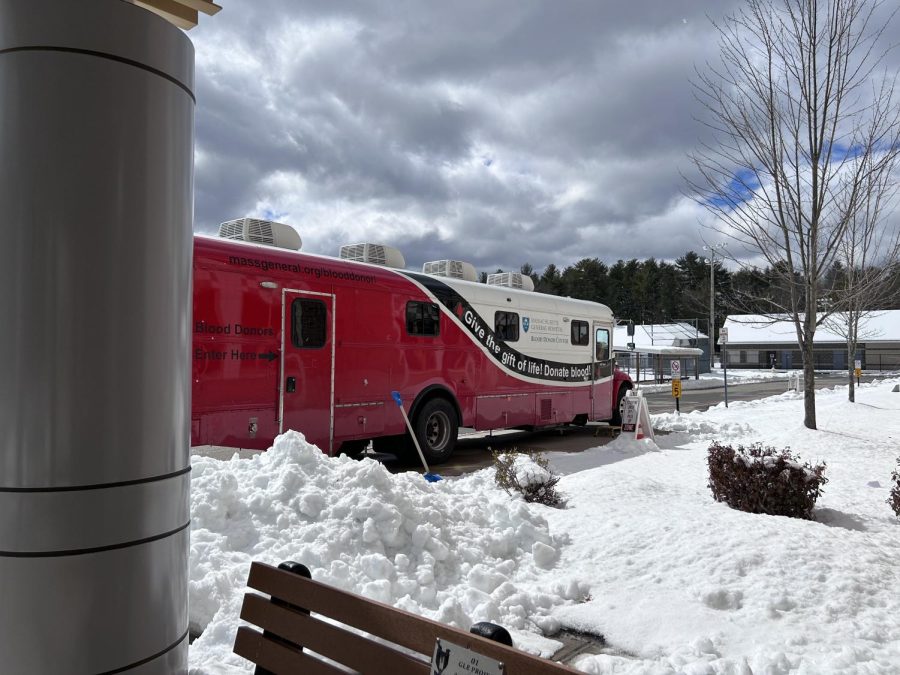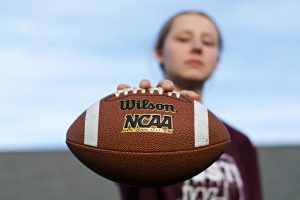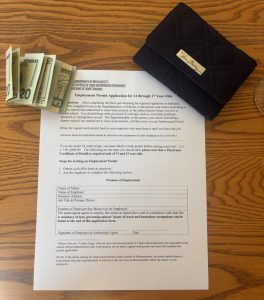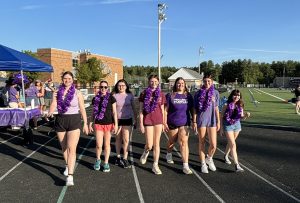HOSA successfully pulls off blood drive despite delay
Mass General Hospital’s bloodmobile parked outside the Flag Lobby during the blood drive.
March 22, 2023
HOSA hosted a blood drive on March 15 at WA in coordination with Mass General Hospital (MGH) following a snow day and a two-hour delay the day of. More than 30 faculty members and students 16 years old and over signed up to donate blood between 8:30 a.m. to 1:30 p.m., but the delay pushed the blood drive to 11:30 a.m.
Westford received six inches of snow the day before, causing the schools to shut down. On Mar. 15, superintendent of Westford Public Schools (WPS) Dr. Christopher Chew announced a two-hour delay to provide crews “with a necessary time to finish the parking lots and sidewalks.” Despite the delay, HOSA was able to pull off the blood drive with their many volunteers. There were volunteers for registering donors on arrival, making sure that donors were okay when they left, and keeping track of when someone is arriving and leaving.
Blood drive coordinator and senior Vaibhav Singh led a committee of six people who were selected from applications. The committee helped with hanging up posters and flyers around the school, signups at lunch, and advertising the blood drive on the announcements. Members of the committee assisted with issues on the day of the blood drive as well.
“[The blood drive] went smoothly. The biggest problems were rescheduling and there was a long wait for the donors at one point because the bloodmobile lost their internet connection which meant they couldn’t continue without it,” Singh said.
When signing up to donate blood, donors had to choose from 15-minute-long time slots. Those who signed up for slots between 8:30 and 9:45 am had to reschedule their slots to the end of the day.
“The biggest challenge was dealing with the delay and finding more people to fill the slots,” Singh said. “It’s also hard when you have people waiting to donate blood and you can’t send them in yet because these things take time.”
Fortunately, the blood drive committee was able to overcome these challenges and had more than 30 people donate. There was a continuous stream of people going in and out to donate. Singh is proud of the number of donors they got in spite of losing three hours of time and the Wi-Fi outage.
Junior Katherine Dodos, a second-time blood donor, provided her input on how the process went for her.
“Hearing that it’s going to people who need it, feels good. The process was pretty fast, and the testing went well,” Dodos said. “Sometimes when I’m done donating I almost pass out or feel light headed, [but] the people who work in the truck take care of me and make sure that I feel okay when I get out of the truck.”
MGH’s bus, called the Bloodmobile, pulled in behind the flag lobby, which is where students donated blood. The blood will help out patients at MGH. Each volunteer donated one pint of blood, which will help save three lives each. Blood transfusions help replace blood lost in injuries or surgeries, and help people with disorders that prevent them from making blood correctly.
“[Last blood drive, we helped] a baby who needed an LVAD wire in to help her heartbeat, a 22-year-old in a car accident, a lot of people in emergency accidents, elderly who needed transplants, and children needing mitral heart valve repairs,” Singh said. “There are just so many things that the blood goes to.”
Although students under 16 could not donate, Singh recommends asking others to donate or joining HOSA to volunteer in the next blood drive.
“We open the blood drive up to everyone in Westford because this is a community thing, going to our community hospital,” Singh said. “Even if you are not old enough to donate yourself, you can still ask your parents, relatives, and anyone you know who’s old enough to donate to contribute to a great cause.”
One of the HOSA club advisors, Alexandra Gallo, adds that a lot of young people get turned away because they don’t have enough iron in their blood.
“If you think you might want to donate [in the future] and you’re younger, you might want to make sure you’re getting enough iron in your diet. By taking a multivitamin, eating lots of spinach, eating red meat, or finding another way to get iron in your diet if you can’t eat meat, [you can] make sure that you’re healthy enough to give blood when the time comes,” Gallo said.
In comparison to the last blood drive that took place in Nov. 2022, Singh said that it was not as successful because of the delay and Wi-Fi issues, but that the blood drive did extremely well with all the circumstances. He adds that the second blood drive does not usually get as many donors since people are not as likely to donate twice a year.
Students who donated blood will be able to see how their donation made an impact on the world.
“[MGH] collects blood from the volunteers and uses it in their hospital to help save lives that very week. They track who gets the blood that they collect from us and then they tell us, ‘these are the people you helped save’, like a seven-year-old cancer patient,” Gallo said. “It’s really cool to be able to directly see what our donations do to save other people’s lives and other people’s families.”








